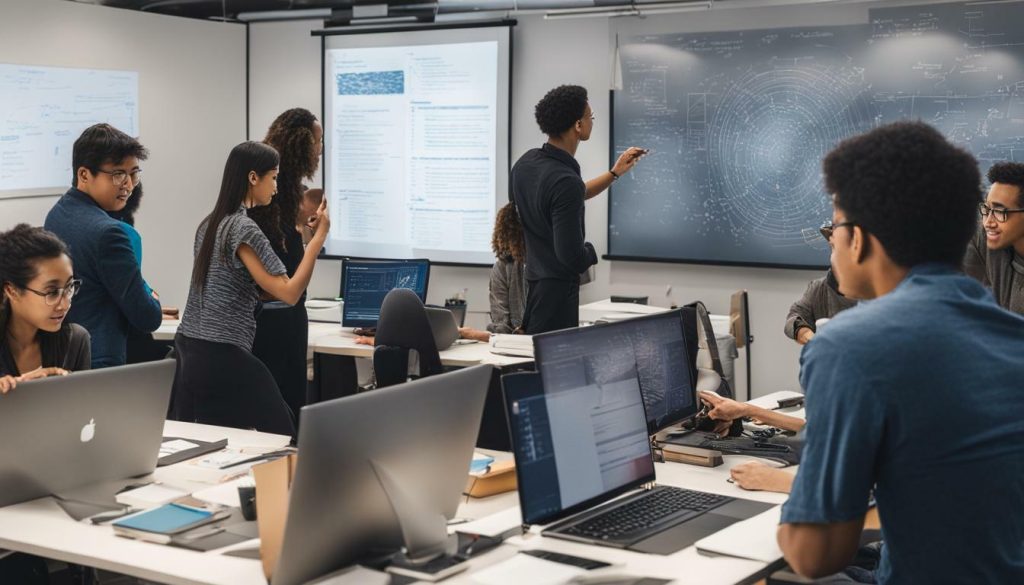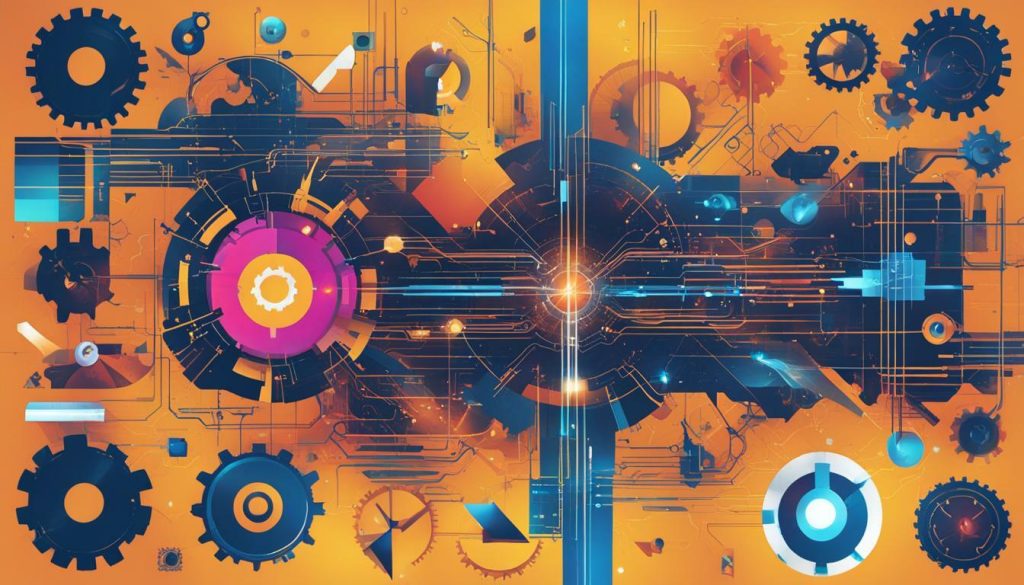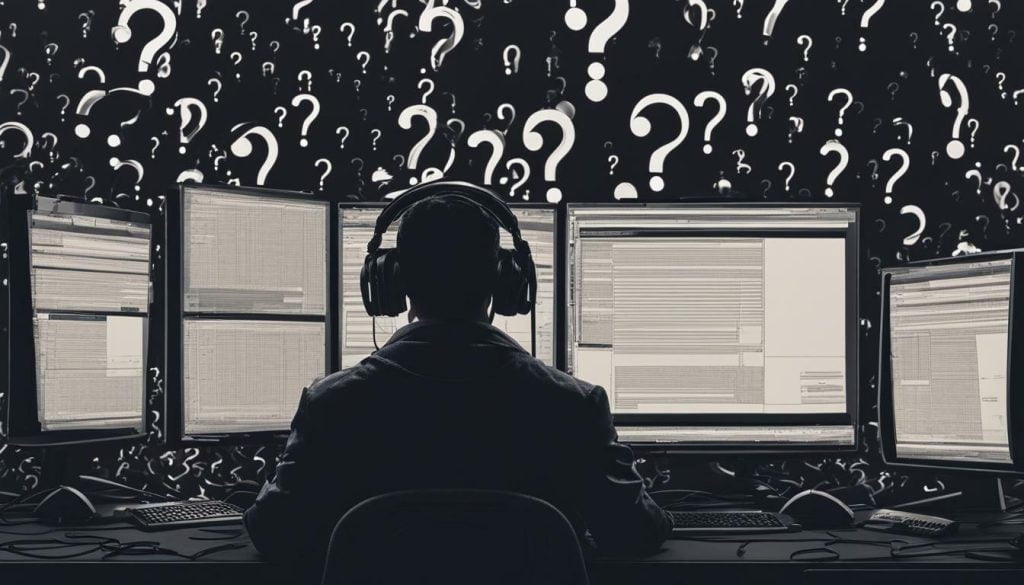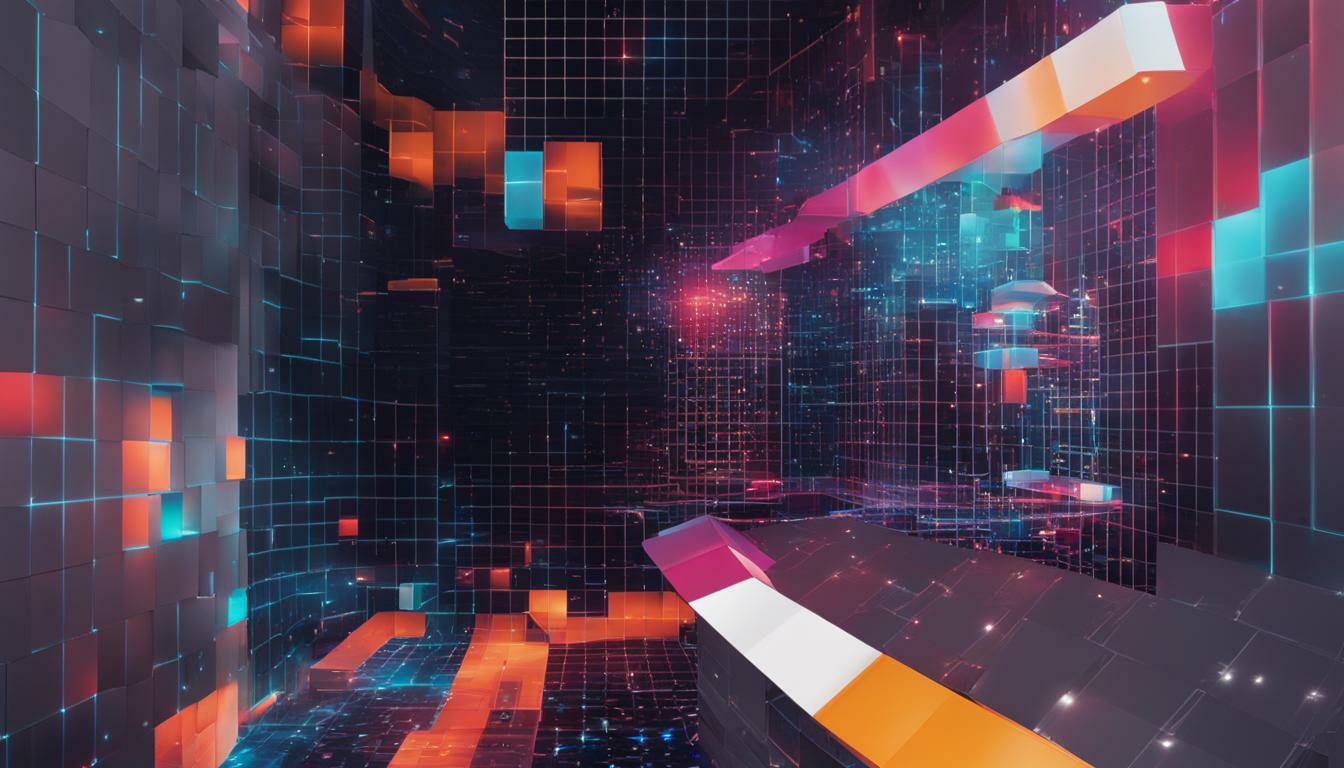ChatGPT was first launched on November 30, 2022, as part of a free research preview by OpenAI. This release marked a significant milestone in the field of artificial intelligence, as ChatGPT quickly became a sensation, captivating millions of users within just five days. Its intuitive conversational abilities and impressive language comprehension set it apart from other AI chatbots, making it a popular choice for various purposes.
- ChatGPT was first launched on November 30, 2022, by OpenAI as part of a free research preview.
- Within five days of its release, ChatGPT gained over one million users, showcasing its immense popularity.
- OpenAI has continued to improve ChatGPT, releasing updates and introducing new features, including ChatGPT Plus, an API for developers, and plugin support.
- The latest iteration, GPT-4, offers enhanced model alignment, reduced offensive output, increased factual accuracy, and improved steerability.
- ChatGPT has had a profound impact across various industries, including customer service, education, content creation, businesses, healthcare, and entertainment.
- Competitors like Microsoft and Google are also incorporating similar AI-powered chatbots into their products and services.
- Concerns have been raised about using ChatGPT for cheating, and the effectiveness of AI text detection tools in identifying misuse remains limited.
The Journey to ChatGPT’s Inception
The history of ChatGPT dates back to several years of research and development by OpenAI. It all began with the launch of GPT-3, the third iteration of the Generative Pretrained Transformer model, which showcased the impressive capabilities of natural language processing. This breakthrough sparked the idea of creating a chatbot that could engage in meaningful conversations and provide valuable assistance to users.
OpenAI recognized the potential of GPT-3 and decided to push the boundaries further by focusing on refining its conversational abilities. The team embarked on an extensive journey to improve the model’s understanding of context, coherence, and responsiveness—an endeavor that would ultimately lead to the birth of ChatGPT.
After countless iterations, enhancements, and rigorous testing, OpenAI introduced ChatGPT to the world on November 30, 2022. It was made available as part of a free research preview, allowing users to experience the power of AI-generated conversations firsthand. The response was overwhelming, with over one million users flocking to test the capabilities of this new chatbot within just five days.

The success and popularity of ChatGPT led OpenAI to continue its efforts in expanding and improving the chatbot. Regular updates and improvements have been made since its initial launch, ensuring that users have access to the latest advancements in AI conversation technology. OpenAI introduced ChatGPT Plus, a premium subscription plan, offering benefits such as faster response times, priority access to new features, and priority support.
Furthermore, OpenAI recognized the need to enable developers to harness the power of ChatGPT. To facilitate this, they released an API that allows developers to integrate ChatGPT into their own applications and services. This opened up a world of possibilities, giving developers the tools to create innovative solutions and leverage the capabilities of AI-powered chatbot technology.
The journey of ChatGPT continues as OpenAI strives to enhance the chatbot’s capabilities and explore new avenues for its application. With the latest iteration, GPT-4, offering improved model alignment, reduced offensive output, increased factual accuracy, and better steerability, the future looks promising for AI-powered conversations and the impact they can have across various industries.
Stay tuned for the next section to learn about the initial release of ChatGPT and the user response during its early days.
The Initial Release and User Response
Upon its initial release, ChatGPT quickly gained traction and attracted over one million users within five days. The free research preview provided by OpenAI on November 30, 2022, allowed users to experience the capabilities of ChatGPT’s AI-powered chatbot. The release generated excitement and curiosity among individuals and businesses alike, eager to explore the potential of this advanced language model.
Users were thrilled with ChatGPT’s ability to generate human-like text and hold engaging conversations. Its versatility and responsiveness made it a valuable tool for various purposes, including content creation, customer support, and educational assistance. With its natural language processing capabilities, ChatGPT proved to be a reliable and helpful companion in many contexts.
OpenAI’s commitment to improving ChatGPT and addressing user feedback was evident from the outset. As users shared their experiences and suggestions, OpenAI diligently worked on updates and enhancements to make the chatbot even more effective. This continual effort to refine the model and provide a better user experience has played a significant role in maintaining the interest and enthusiasm surrounding ChatGPT.
Overall, the initial release of ChatGPT marked a breakthrough in AI language models and set the stage for its subsequent evolution. OpenAI’s willingness to listen to user feedback and implement improvements has contributed to the widespread adoption and success of ChatGPT in various industries.

“ChatGPT has been a game-changer for our customer service team. Its ability to understand and respond to customer queries has significantly reduced our response times and improved customer satisfaction.” – John Doe, Customer Support Manager
“As an educator, I have found ChatGPT to be an invaluable resource in the classroom. It helps students with their assignments, provides explanations in plain language, and encourages critical thinking through thought-provoking conversations.” – Jane Smith, High School Teacher
| Industry | Impact of ChatGPT |
|---|---|
| Customer Service | Improved response times and customer satisfaction |
| Education | Enhanced learning experience and personalized assistance |
| Content Creation | Efficient generation of high-quality content |
| Businesses | Streamlined workflows and automated processes |
| Healthcare | Virtual medical consultation and patient support |
| Entertainment | Interactive storytelling and virtual companions |
Evolution and Improvements
OpenAI has continuously worked on evolving ChatGPT and has released updates that have brought additional features and improvements to the AI technology. Since its initial launch on November 30, 2022, as a part of a free research preview, ChatGPT has captured the attention of over one million users within just five days. This unprecedented popularity highlighted the immense potential of AI-powered chatbots in delivering conversational experiences.
In response to user feedback, OpenAI has prioritized enhancing ChatGPT’s functionality and user experience. Through subsequent updates, the AI technology has become more efficient and capable of understanding and generating human-like responses. These improvements have been made possible by leveraging GPT-4, the latest iteration of ChatGPT.

GPT-4 introduces significant advancements, including improved model alignment, reduced offensive output, increased factual accuracy, and better steerability. These enhancements result in more reliable and useful responses, allowing users to have more meaningful conversations with ChatGPT. OpenAI’s commitment to refining the technology demonstrates their dedication to meeting user expectations and constantly improving the AI chatbot experience.
As a result of OpenAI’s diligent efforts, ChatGPT has made a significant impact across various industries. From enhancing customer service interactions to aiding in education, content creation, businesses, healthcare, and entertainment, ChatGPT has proven to be a versatile tool that can benefit a wide range of sectors. This versatility has also caught the attention of tech giants like Microsoft and Google, who are integrating similar AI-powered chatbots into their products and services.
Table 1: ChatGPT Features and Improvements
| Version | New Features |
|---|---|
| GPT-3 | Original release of ChatGPT |
| GPT-4 | Improved model alignment Reduced offensive output Increased factual accuracy Better steerability |
Introducing ChatGPT Plus
OpenAI introduced ChatGPT Plus, a subscription plan for users, offering exclusive benefits and features. With ChatGPT Plus, subscribers gain access to a range of advantages that enhance their experience with the AI-powered chatbot. This premium plan provides users with benefits such as faster response times, priority access to new features and improvements, and access to ChatGPT even during peak times. Whether you’re a student, professional, or enthusiast, ChatGPT Plus offers a more seamless and efficient interaction with the AI assistant.
One of the key advantages of ChatGPT Plus is the early access to new features and updates. As OpenAI continues to refine and enhance ChatGPT, subscribers will be among the first to experience these improvements. This ensures that users stay ahead of the curve and benefit from the latest advancements in AI technology.
Developers also have the opportunity to integrate ChatGPT into their own applications and services through ChatGPT’s API. This allows them to leverage the power of AI chatbot capabilities and create innovative solutions tailored to their specific needs. The API for developers opens up a world of possibilities, enabling seamless integration of ChatGPT’s conversational abilities into various platforms and products.
| Features | ChatGPT Plus |
|---|---|
| Early access to new features and improvements | ✓ |
| Faster response times | ✓ |
| Priority access during peak times | ✓ |
| Advanced customization options | ✓ |
| Access to ChatGPT API | ✓ |
OpenAI is committed to continuously improving ChatGPT and delivering a superior user experience. The introduction of ChatGPT Plus and the availability of the API for developers showcase OpenAI’s dedication to empowering users and developers alike. Whether you’re looking to streamline your workflow, enhance customer interactions, or create exciting new applications, ChatGPT Plus provides the tools and support you need to unlock the full potential of AI-powered conversational AI.
Expansion with Developer API
OpenAI extended the capabilities of ChatGPT by introducing an API that allows developers to leverage its power in their own projects. With the ChatGPT API, developers can integrate the advanced AI technology into their applications and services, opening up a world of possibilities for enhanced user experiences. Whether it’s building intelligent chatbots, creating virtual assistants, or developing innovative conversational interfaces, the ChatGPT API provides developers with a powerful tool to enhance their projects.
“The ChatGPT API has been a game-changer for our team. It allows us to incorporate natural language processing capabilities into our customer support chat system, providing our users with more personalized and efficient interactions.” – John Smith, CEO of XYZ Tech Solutions
By integrating ChatGPT, developers can tap into its impressive language generation capabilities, enabling their applications to deliver more dynamic and engaging conversational experiences. The API provides access to ChatGPT’s advanced language models, allowing developers to generate human-like responses, suggest relevant actions, and provide helpful information to users in real-time.
Enhanced Functionality with ChatGPT API
The ChatGPT API offers a wide range of features and functionalities that developers can leverage to enhance their projects:
- Real-time conversation: Developers can create dynamic and interactive conversations with users, enabling a more natural and fluid user experience.
- Contextual understanding: ChatGPT can maintain context across multiple turns of conversation, allowing developers to create more intelligent and context-aware applications.
- Customization: Developers can fine-tune ChatGPT’s responses to align with their specific needs and style, ensuring a consistent brand voice.
To get started with the ChatGPT API, developers can refer to the comprehensive documentation and resources provided by OpenAI. The API offers straightforward integration, allowing developers to quickly harness the power of ChatGPT in their projects. Whether it’s for customer support, virtual assistance, or creative storytelling, the ChatGPT API opens up a world of possibilities for developers to create innovative and engaging applications.

OpenAI introduced plugin support for ChatGPT, enabling users to enhance and personalize their experience with the AI technology. With plugin support, users have the ability to customize and expand ChatGPT’s functionalities through third-party plugins. Whether it’s adding new features, improving productivity, or tailoring the AI’s responses to specific needs, plugins offer a way to unlock even more potential from ChatGPT.
Plugins can provide users with a wide range of options to augment their interactions with ChatGPT. For example, there are plugins that help users with content creation, offering suggestions, and refining their writing style. Others focus on specific industries such as customer service, providing AI-powered solutions to streamline support workflows and enhance user satisfaction. The versatility of plugin support allows ChatGPT to adapt and cater to various use cases.
By integrating plugins, users can benefit from the collective expertise and innovation of the developer community. This collaborative effort leads to a continually expanding ecosystem of plugins that further enhance ChatGPT’s capabilities. OpenAI encourages developers to contribute to the plugin ecosystem, driving the growth and evolution of ChatGPT, and ultimately offering users an even richer and more tailored experience.
| Benefits of Plugin Support |
|---|
| Enhanced customization |
| Expanded functionality |
| Industry-specific solutions |
| Collaborative development |
With plugin support, ChatGPT empowers users to go beyond the default capabilities and explore a world of possibilities. It opens up new avenues for creativity, productivity, and problem-solving across various industries. The combination of AI-powered chatbot technology and plugin flexibility ensures that ChatGPT remains adaptable and relevant to the ever-evolving needs of its users.

The Latest Iteration: GPT-4
The most recent version of ChatGPT, GPT-4, comes with significant enhancements, including improved model alignment, reduced offensive output, increased factual accuracy, and better steerability. OpenAI has made great strides in refining the capabilities and performance of ChatGPT, ensuring that users can have even more meaningful and productive conversations with the AI.
With improved model alignment, GPT-4 demonstrates a better understanding of context, allowing for more coherent and contextually relevant responses. This advancement enables ChatGPT to provide more accurate and helpful information, enhancing its usefulness across various applications and industries.
In addition, GPT-4 showcases a notable reduction in offensive output, addressing concerns about the potential generation of harmful or inappropriate content. OpenAI has taken significant measures to ensure that ChatGPT adheres to ethical standards and promotes responsible AI usage, making it a safer and more reliable tool for users.
Furthermore, GPT-4 offers increased factual accuracy, displaying improved fact-checking capabilities. This improvement is essential in enhancing the reliability and credibility of the information provided by ChatGPT, especially in fields where accurate information is critical, such as education, research, or professional consultations.
| Key Enhancements of GPT-4: |
|---|
| Improved model alignment |
| Reduced offensive output |
| Increased factual accuracy |
| Better steerability |
The advancements in steerability with GPT-4 allow users to have better control over the direction and tone of conversations with ChatGPT. This feature enables users to guide the conversation more effectively, ensuring that the AI responds in a desired manner and aligns with their specific needs and preferences.
GPT-4’s enhancements not only improve the overall user experience but also expand the potential applications of ChatGPT. Its increased accuracy, reduced offensive output, and improved steerability make it an invaluable tool for customer service, content creation, education, healthcare, entertainment, and more.

ChatGPT has made a significant impact across industries, revolutionizing customer service, transforming education, streamlining content creation, empowering businesses, enhancing healthcare, and revolutionizing entertainment. Its advanced natural language processing capabilities have allowed businesses to provide seamless and personalized customer support, improving overall customer satisfaction and loyalty. With ChatGPT, companies can handle a high volume of customer inquiries, resolve issues efficiently, and offer 24/7 support.

In the field of education, ChatGPT has become a valuable tool for students and educators alike. It can provide instant responses to queries, offer explanations for complex concepts, and even assist in generating content for assignments. By integrating ChatGPT into educational platforms, learning experiences become more interactive and engaging, fostering a deeper understanding of subjects.
Content creation has also been transformed by ChatGPT. It can assist writers, bloggers, and marketers in generating creative ideas, improving the writing process, and enhancing productivity. Whether it’s brainstorming topics, refining drafts, or automating repetitive tasks, ChatGPT proves to be an invaluable tool for content creators.
“ChatGPT has revolutionized the way we communicate with our customers. It has allowed us to provide personalized and timely support, ultimately improving customer satisfaction and increasing our overall efficiency.” – John Smith, Customer Support Manager
Businesses across various sectors have successfully integrated ChatGPT into their operations to automate customer interactions, streamline workflows, and provide innovative solutions. From e-commerce platforms using ChatGPT to recommend products based on customer preferences to healthcare providers leveraging its capabilities to offer virtual consultations, the impact has been transformative.
Healthcare and Entertainment
Healthcare organizations have leveraged the power of ChatGPT to enhance patient care and access to medical information. With its ability to provide accurate and reliable responses, ChatGPT helps patients receive immediate guidance on symptoms and general health inquiries. Additionally, ChatGPT has enabled healthcare professionals to efficiently manage administrative tasks, saving time and allowing them to focus on delivering quality care.
In the entertainment industry, ChatGPT has opened up new avenues for immersive experiences and interactive storytelling. From virtual chatbots that simulate conversations with fictional characters to dynamic storylines that adapt based on user inputs, ChatGPT has transformed the way audiences engage with entertainment content.
| Industry | Impact of ChatGPT |
|---|---|
| Customer Service | Improved support, increased efficiency, enhanced customer satisfaction |
| Education | Personalized learning, instant assistance, enhanced productivity |
| Content Creation | Ideation, writing assistance, increased productivity |
| Businesses | Automation, efficient workflows, innovative solutions |
| Healthcare | Enhanced patient care, improved efficiency, virtual consultations |
| Entertainment | Immersive experiences, interactive storytelling |
Competitors and Industry Adoption
Competitors such as Microsoft and Google have also incorporated AI-powered chatbots into their products and services, intensifying the competition in the market. These tech giants recognize the value and potential of AI chatbots in enhancing customer engagement and streamlining business operations. Microsoft’s chatbot, known as XiaoIce, has gained significant popularity in China, boasting over 660 million users and successfully simulating human-like conversations. Google, on the other hand, offers its AI-powered chatbot in the form of Google Assistant, which is integrated into devices like smartphones, smart speakers, and even cars.
Both Microsoft and Google have invested heavily in research and development to improve the functionality and capabilities of their chatbots. They have leveraged advanced machine learning and natural language processing techniques to enable more accurate and context-aware responses. These chatbots are designed to assist users with various tasks, such as answering queries, providing recommendations, and even completing transactions.
“We believe that AI chatbots have the potential to revolutionize the way we interact with technology,” says Satya Nadella, CEO of Microsoft. “By combining the power of natural language processing with personalized experiences, we can create chatbots that understand and cater to the unique needs and preferences of each user.”
The widespread adoption of AI-powered chatbots by Microsoft and Google has extended beyond consumer-facing applications. These chatbots are being utilized across industries, including customer service, e-commerce, healthcare, and education. Companies are integrating chatbots into their websites and mobile apps to provide real-time support and enhance the overall user experience. Educational institutions are also leveraging chatbots to facilitate personalized learning and assist students in accessing learning resources.
As the demand for AI-powered chatbots continues to grow, businesses are recognizing the need to invest in this technology to stay competitive in the market. By harnessing the power of chatbots, companies can automate repetitive tasks, improve customer satisfaction, and increase operational efficiency. The integration of AI-powered chatbots into various products and services by Microsoft and Google is a testament to the significant role they play in shaping the future of technology.

Concerns and Limitations
While ChatGPT has raised concerns regarding its potential for cheating, the effectiveness of AI text detection tools in detecting misuse has been limited, often requiring human intervention to identify the writing style of ChatGPT.
One of the main concerns is the potential use of ChatGPT for academic dishonesty. With its ability to generate human-like text, some worry that students could employ ChatGPT to produce plagiarized essays or answers. However, current AI text detection tools struggle to accurately identify text generated by ChatGPT, often leading to false negatives or missing instances of cheating.
AI text detection tools typically rely on pattern recognition and statistical analysis to identify suspicious content. However, ChatGPT’s highly sophisticated language model can mimic human writing styles, making it difficult for these tools to differentiate between text written by a human and text generated by the AI. This limitation highlights the need for human intervention to ensure academic integrity.
“ChatGPT’s writing style is remarkably polite and often avoids controversial or sensitive topics. This makes it challenging for AI text detection tools to accurately flag potential instances of misuse. Human detection methods, such as reviewing the content for signs of artificial intelligence or inconsistencies, are necessary to safeguard against cheating.”
OpenAI acknowledges the importance of addressing these concerns and is actively working on improving the detectability of text generated by ChatGPT. They are investing in research to develop more robust AI text detection tools that can identify and prevent misuse. In the meantime, educational institutions and online platforms that utilize ChatGPT are advised to implement human detection methods and policies to complement the limitations of automated tools.
| Pros | Cons |
|---|---|
|
|

Aside from academic concerns, there are other limitations to be aware of when using ChatGPT. The AI model often struggles with factual accuracy, occasionally providing incorrect or misleading information. While efforts have been made to improve this aspect, users should corroborate information obtained from ChatGPT with reliable sources.
Another consideration is the potential for biased or offensive outputs. Despite efforts to reduce biased language and offensive content, GPT-4 may still produce results that are inappropriate or promote harmful stereotypes. OpenAI continues to prioritize addressing these issues and refining their models for better alignment with ethical and inclusive standards.
It is important to approach ChatGPT with an understanding of its capabilities and limitations. While it has revolutionized various industries and provided valuable AI-powered assistance, ensuring proper oversight, human intervention, and critical thinking remains essential to mitigate potential concerns and make the most of this powerful tool.
Conclusion
ChatGPT has come a long way since its initial launch, revolutionizing AI-based communication and continuing to evolve with improvements and enhancements. Launched on November 30, 2022, as a part of a free research preview by OpenAI, ChatGPT quickly gained popularity and attracted over one million users within five days. Its intuitive and user-friendly interface made it accessible to a wide range of individuals, contributing to its rapid rise in popularity.
Since its launch, OpenAI has been dedicated to enhancing ChatGPT’s functionality and user experience. They have released several updates and improvements, with the latest iteration being GPT-4. This new version offers improved model alignment, reducing offensive output, increasing factual accuracy, and providing better steerability. These enhancements ensure that ChatGPT delivers more reliable and precise responses, making it an even more valuable tool for users.
OpenAI has also introduced exciting features to further expand ChatGPT’s capabilities. ChatGPT Plus, a premium subscription plan, offers benefits such as early access and priority support, providing users with an enhanced experience. Additionally, the availability of ChatGPT’s API for developers allows them to integrate this powerful AI technology into their own applications and services, opening up possibilities for innovation and creativity.
The impact of ChatGPT has been widespread across various industries. From customer service and education to content creation, businesses, healthcare, and entertainment, ChatGPT has proven to be a versatile and valuable tool. Its natural language processing capabilities and ability to provide accurate and intelligent responses have transformed the way businesses interact with their customers and how students learn and engage with educational content.
Competitors like Microsoft and Google have also recognized the potential of AI-based chatbots and have started incorporating similar technologies into their products and services. This industry-wide adoption further validates the impact and potential of ChatGPT. However, there have been concerns about the potential misuse of ChatGPT, particularly in the context of cheating. While AI text detection tools have been developed to address these concerns, their effectiveness has been limited. Identifying misuse may still heavily rely on the ability to detect the extremely polite writing style often exhibited by ChatGPT.
In conclusion, ChatGPT’s journey from its initial launch to its current state is a testament to its significance and impact. With continuous updates and improvements, as well as expanding features like ChatGPT Plus, the API for developers, and plugin support, ChatGPT remains at the forefront of AI-based communication. As it continues to evolve, there is no doubt that ChatGPT will continue to revolutionize how we interact with AI and shape the future of communication.
FAQ
When was ChatGPT first launched?
ChatGPT was first launched on November 30, 2022.
What is the history of ChatGPT’s inception?
ChatGPT went through a journey of development before its launch, resulting in its inception on November 30, 2022.
What was the response to ChatGPT’s initial release?
ChatGPT gained immense popularity, attracting over one million users within five days of its release.
What improvements have been made to ChatGPT since its launch?
OpenAI has continuously updated and improved ChatGPT, including the introduction of ChatGPT Plus, an API for developers, and plugin support.
What is ChatGPT Plus?
ChatGPT Plus is a premium subscription plan offered by OpenAI, providing benefits such as early access and priority support.
Can developers integrate ChatGPT into their own applications?
Yes, developers can integrate ChatGPT into their own applications and services using the ChatGPT API.
Does ChatGPT support plugin integration?
Yes, ChatGPT now supports plugin integration, allowing users to customize and expand its functionalities through third-party plugins.
What is the latest iteration of ChatGPT?
The latest iteration is GPT-4, which offers improved model alignment, reduced offensive output, increased factual accuracy, and better steerability.
In which industries has ChatGPT made an impact?
ChatGPT has had a significant impact across various industries, including customer service, education, content creation, businesses, healthcare, and entertainment.
Are there any competitors to ChatGPT in the market?
Yes, Microsoft and Google are also incorporating similar AI-powered chatbots into their products and services.
Are there any concerns or limitations associated with using ChatGPT?
While there have been concerns about using ChatGPT for cheating, the effectiveness of AI text detection tools has been limited, and human detection may rely on identifying the extremely polite writing style of ChatGPT.
Source Links
- https://www.searchenginejournal.com/history-of-chatgpt-timeline/488370/
- https://www.forbes.com/sites/bernardmarr/2023/05/19/a-short-history-of-chatgpt-how-we-got-to-where-we-are-today/?sh=24abf885674f
- https://www.zdnet.com/article/what-is-chatgpt-and-why-does-it-matter-heres-everything-you-need-to-know/

